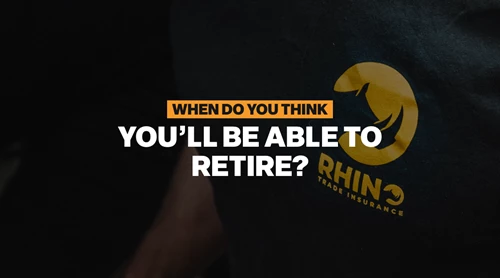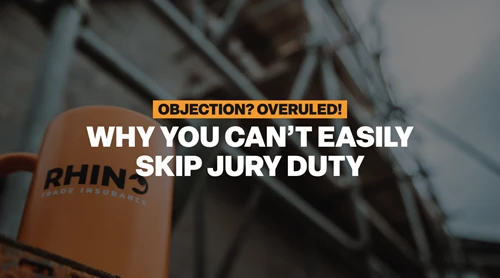Whether you're a sparky, a chippy, a plumber, or a brickie, one thing's for sure - you're the backbone of our nation. But let's get real for a moment; taxes are about as much fun as a leaking roof in the middle of winter. The good news? Rhino is here to help you wade through the tax jungle and make sense of the self-employed tax brackets for 2024.
The Lowdown on Self-Employment
Alright, first things first - what does being self-employed really mean? It means you're the master of your own destiny, the captain of your own ship. Whether you're a plumber, carpenter, electrician, or any other skilled tradesperson, if you're running your own show, you're self-employed.
Being self-employed comes with a unique set of challenges and perks. You have the freedom to choose your projects, set your rates, and be your own boss. But, and it's a big but, you're also responsible for managing your own finances, and that includes navigating the murky waters of taxes.
Breaking Down the Tax Brackets
Okay, let's dive into the nitty-gritty of self-employed tax brackets in 2024. In the UK, the tax system for the self-employed is based on your profits - that's the money you make after deducting your allowable expenses.
- Basic Rate: 20%
For the tax year 2024/25, the basic rate for self-employed individuals remains at 20%. This applies to your taxable income up to £50,270. So, if you're raking in the cash and your profits fall within this range, you'll be handing over a fifth of your hard-earned money to the taxman.
- Higher Rate: 40%
Now, if you're living the high life with profits above £50,270, you'll hit the higher rate of 40%. This means that anything you earn above the threshold is going to be taxed at almost double the basic rate. So, while the extra cash is fantastic, be prepared to share the love with His Majesty's Revenue and Customs (HMRC).
- Additional Rate: 45%
If you're really killing it and your profits exceed £150,000, welcome to the elite club of the additional rate taxpayers. At this level, you're looking at a 45% tax rate on the portion of your profits that surpass the £150,000 mark. It's the price of success, my friend.
Deducting Your Allowable Expenses
Now, before you start counting the pennies that will soon be leaving your pocket, there's some good news. As a self-employed tradesperson, you're entitled to deduct certain expenses before calculating your taxable profits. These allowable expenses can be a game-changer when it comes to reducing your overall tax bill.
- Materials and Tools
Whether you're splurging on a state-of-the-art drilling machine or stocking up on paintbrushes and rollers, the cost of materials and tools is a legitimate expense. Keep those receipts - they're your golden ticket to reducing your taxable profits.
- Vehicle Expenses
If you rely on a van or vehicle for your trade, you can claim expenses for fuel, insurance, repairs, and even a portion of your vehicle's purchase cost through capital allowances. Just be sure to keep a detailed record of your business-related journeys.
- Home Office Costs
With plenty of people opting to work from a home office instead of a work unit, many tradespeople find themselves managing paperwork and admin tasks from the comfort of their home. Fear not - a portion of your home office costs, including utility bills and internet expenses, can be claimed as allowable expenses.
- Training and Professional Development
Staying at the top of your game often involves investing in your skills. Luckily, expenses related to training and professional development can be deducted from your taxable profits. It's a win-win - you boost your skills, and HMRC cuts you some slack on your tax bill.
- Marketing and Advertising
Whether you're investing in snazzy business cards, a killer website, or even running ads in the local paper, marketing and advertising costs are deductible. Just remember, building your brand isn't just good for business - it's good for your bottom line when tax season rolls around.
- Uniform and Protective Gear: Safety First, Tax Relief Second
If you're donning a uniform or rocking some serious safety gear on the job, you can claim tax relief on the costs. High-vis jackets, steel-toe boots, and branded workwear are not just a fashion statement - they're a potential deduction that could lighten your tax load.
A Quick Mention On Allowances
Personal Allowance: Every tax year, you're entitled to a personal allowance - that's a certain amount of your income that you can earn tax-free. For 2024/25, the personal allowance stands at £12,570. This means you don't have to pay a penny in income tax on this portion of your profits. It's like getting a tax-free bonus - make the most of it!
National Insurance Contributions (NICs)
National Insurance Contributions (NICs) for self-employed tradespeople are vital contributions to the social welfare system. There are two classes of NICs that concern the self-employed: Class 2 and Class 4.
Class 2 NICs are mandatory if your annual profits exceed £6,515 (as of 2024). However, if your profits fall below this threshold, you can choose to pay Class 2 NICs voluntarily to maintain access to state pension and other benefits. The weekly rate for Class 2 NICs is £3.05, payable alongside your self-assessment tax return.
Class 4 NICs come into play if your profits surpass £9,570. They are calculated at 9% on profits between £9,570 and £50,270 and 2% on profits above £50,270. Class 4 NICs are automatically calculated as part of your self-assessment tax return.
Paying NICs provides eligibility for various benefits, including the state pension, maternity allowance, jobseeker's allowance, and sick pay. These contributions are essential for securing financial support during times of need and ensuring a comfortable retirement. NICs are typically paid alongside your self-assessment tax return by the end of January each year.
Understanding and fulfilling your National Insurance obligations not only comply with legal requirements but also unlock a range of benefits that contribute to your long-term financial security and well-being.
The Final Word
So, there you have it, tradespeople - a crash course in self-employed tax brackets in 2024. While taxes might not be the most thrilling part of your business, mastering them is a key ingredient in your recipe for success.
Remember, you're not alone in this. Thousands of skilled artisans like yourself are navigating the same tax waters. Share your experiences, learn from others, and, most importantly, stay proactive. With a bit of knowledge, a dash of strategy, and a sprinkle of organisation, you'll be conquering the tax maze like a true tradesperson extraordinaire.
Here's to smooth tax, thriving businesses, and never-ending cups of tea in your well-deserved breaks. And for the best insurance, call the Rhino team at 0116 243 7904.




